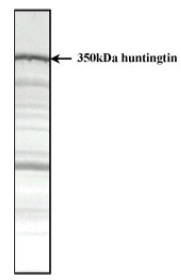Huntingtin (HTT) Mouse Monoclonal Antibody [Clone ID: HDC8A4]
Other products for "HTT"
Specifications
| Product Data | |
| Clone Name | HDC8A4 |
| Applications | IHC, IP, WB |
| Recommended Dilution | Immunohistochemistry on frozen sections. Immunoprecipitation. Western blot. |
| Reactivities | Human, Mouse, Rabbit |
| Host | Mouse |
| Isotype | IgG1 |
| Clonality | Monoclonal |
| Immunogen | Recombinant protein corresponding to amino acids 2703 - 2911 of huntingtin |
| Specificity | This antibody reacts with an epitope corresponding to the HDC region (2703 - 2911 amino acids) of the huntingtin protein. Clone HDC8A4 detects a 350KD band on western blots but also detects smaller degradation products of huntingtin. Clone HDC8A4 recognises both denatured and native huntingtin in human brain. The combined use of clone HDC8A4 (SM1662), HDB4E10 (SM1661) and HDA3E10 (SM1660) demonstrate that huntingtin is enriched in neuronal cells in the brain. |
| Formulation | PBS containing 0.09% Sodium Azide State: Purified State: Liquid purified IgG |
| Concentration | lot specific |
| Purification | Affinity chromatography on Protein G |
| Conjugation | Unconjugated |
| Storage | Store the antibody undiluted at 2-8°C for one month or (in aliquots) at -20°C for longer. Avoid repeated freezing and thawing. |
| Stability | Shelf life: one year from despatch. |
| Gene Name | huntingtin |
| Database Link | |
| Background | Huntington's disease (HD) is a neurodegenerative disorder caused by an expanding polyglutamine repeat in the huntingtin gene. HD is a mid-life onset autosomal dominant neurodegeneative disease that is characterized by psychiatric disorders, dementia, and involuntary movements (chorea), leading to death in 10-20 years. The HD gene product is widely expressed in human tissues, with the highest level of expression in the brain. The huntingtin gene product is expressed at similar levels in patients and controls, which suggests that the expansion of the polyglutamine repeat induces a toxic gain of function perhaps through interactions with other cellular proteins. Using yeast two-hybrid system, HAP1 (huntingtin associated protein 1) has been identified, that associates with huntingtin protein. The In vitro data suggest that the association between HAP1 and huntingtin is enhanced by increasing length of glutamine repeat. |
| Synonyms | Huntington Disease Protein, HD, IT15, HTT |
| Reference Data | |
Documents
| Product Manuals |
| FAQs |
| SDS |
{0} Product Review(s)
0 Product Review(s)
Submit review
Be the first one to submit a review
Product Citations
*Delivery time may vary from web posted schedule. Occasional delays may occur due to unforeseen
complexities in the preparation of your product. International customers may expect an additional 1-2 weeks
in shipping.






























































































































































































































































 Germany
Germany
 Japan
Japan
 United Kingdom
United Kingdom
 China
China



